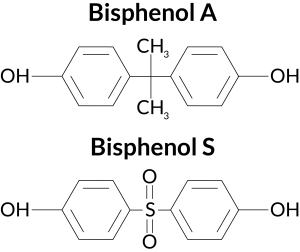 By now most of you know what BPA is, or at least that you likely want to avoid it when possible, especially in your water bottles. Good news on that front…all of Bulletin Bottle’s products are BPA free (read here for more information).
By now most of you know what BPA is, or at least that you likely want to avoid it when possible, especially in your water bottles. Good news on that front…all of Bulletin Bottle’s products are BPA free (read here for more information).
So, what happens when the factory can’t use BPA anymore? What do they do? Well, they use an alternative. One of those (and there are MANY) is commonly referred to as BPS. But let’s back up.
Bisphenol (or, BP) is a common chemical descriptor. The letter that follows denotes a reactant found in that compound. BPA is short for bisphenol-A. And one of its many replacements is bisphenol with phenol and sulfur trioxide, or BPS. There’s your science lesson for the day.
It’s well documented that BPA can leach into liquids, and it’s also known that the risk of this occurring is highest when those liquids get hot (a good plug here for not drinking from that single use disposable bottle in the car!). There is one study that shows that something similar occurs with BPS as well, and that the effects to the body might be similar to with BPA.
What does this mean for you? Well, nothing…yet. While there’s only been one major study on this, we’re guessing more will come at some point. The questions raised are new ones. As such, BPS is still relatively new and unheard of in most circles—even in the plastics and aluminum manufacturing industries!
That said, we do have a large selection of BPS free water bottles on our website. Stainless steel and glass water bottles are not made using BPS, and Tritan copolyester is also BPS free. Further, we have BPA-free plastic bottles made from materials other than Tritan that are made without the use of BPS.
Bulletin Bottle cares deeply about our clients’ health and safety. We are committed to working only with factories that value product safety as much as we do and will continue to monitor developments on BPS.
For more information on which of our bottles are BPS free, please contact us. For more information on our commitment to product safety, click here.
